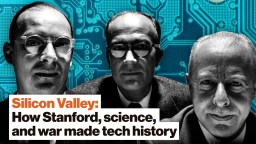MARGARET O'MARA: Ever since the advent of digital computing, technologists had been thinking about how computers could enlarge human capacity, and both in ways that were empowering and also ways that were terrifying. I mean, worries about the robot overlords have been with us for a very long time. You know, there was this combination of fascination and fear with which, not only technologists, but the broader world and the American public viewed the advent of digital computing. Originally, the first computers in the '40s and the '50s were referred to as electronic brains. They were brains that could do better than the mind of man. And that was both exciting and terrifying.
By the time you got to the late 1960s, to the Vietnam generation, computers figure in the American imagination, and particularly in the baby boom generation imagination, as these sort of giant, ominous things that are by and large controlled by very large corporations and by the government. That's where most the computers were, right? So think back to "2001: A Space Odyssey" to HAL, the computer run amok; this giant supercomputer that takes control of the spaceship. That's what computers meant to many people of that generation.
And so, out of that generation come a group of technologists, particularly in the Bay Area, people coming out of Berkeley, out of Stanford. Other people, like Steve Jobs, who are growing up in the Bay Area, who are very much shaped, not only by their exposure to computers in this period, because that's when computers are going into schools, like Steve Jobs's high school computer lab; that was one of the things about growing up in the Bay Area is you're one of the first places to be a high schooler with access to computers. But a lot of these students and these young people say, OK, the computer should not be just under control of the establishment. What we need to do is, to change the world, we need to take this immense power of the computer and figure out how to make it personal. How to take the computer and make it a tool for empowerment, and enlightenment, and equity, and communication, rather than something that is the holder of government secrets, a maker of war.
And so the personal computer generation has this politics -- it's a politics that's very much adapted from the counterculture of the 1960s -- all this is coexisting and happening at the same time; everyone's listening to the same music and doing the same drugs. But what's really different is that technologists, they weren't all hippies. They were, you know, a lot of them were pretty straight-laced. But they did share this techno-utopianism, this belief that technology was going to be a tool for empowerment. You hear one person after another -- people like Stewart Brand, the founder and publisher of the Whole Earth Catalog. People like Ted Nelson, the person who thinks up the idea of hypertext and creates this manifesto in the early 1970s that's talking about -- that is entitled Computer Lib -- how computers can liberate. And this is the foundational politics of this computer generation, that all of the concerns about inequity, and sexism, and racism, and the control by faceless bureaucracies and institutions -- all that could be solved if people had their own computers and had a way to communicate with them.
Now, that's a pretty idealistic idea. It's an idea that powered the personal computer generation. But it also was expecting technology to do too much, right? Like we know now, technology didn't fix all those things. Didn't fix it. We created this incredibly liberating platform -- the internet comes out, you know, the modern internet comes out of this internet culture. Social media comes out of this, politics. And social media, yes, has connected us, but it also has divided us. So technology wasn't able to do all the things its creators originally hoped.





